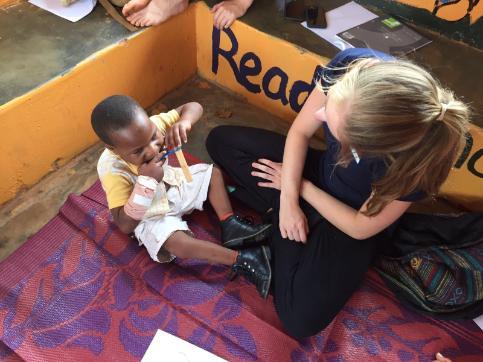“When you hear the word ‘disabled,’ people immediately think about people who can’t walk or talk or do everything that people take for granted. Now, I take nothing for granted. But find the real disability is people who can’t find joy in life and are bitter. “Teri Garr quoted.
Well, that is the whole idea about disabled people. It might be visual, hearing or moving limitations, whichever the case is, it makes the victim so vulnerable to the world.
Uganda is not the best country when it comes to the rights of the disabled people, they are discriminated and left out. They often feel out of place. So this article shows you the need to volunteer with the disabled people in Uganda.
According to the Uganda Population and Housing Census Report (2002), four out of every 25 persons in Uganda are disabled people under the age of 18. The different forms of disability include Difficulty in hearing, Difficulty in speaking, Difficulty in moving around and using other body parts: Difficulty in seeing, strange behavior, Epilepsy, Difficulty in learning, Leprosy and loss of feeling.
Unfortunately, the disabled children continue to experience physical barriers, inadequate information, rehabilitation and unfriendly services. Limited accessibility to such services has contributed to social exclusion of disabled people in the communities they live in.
However, The National Policy on Disability in Uganda aims at promoting equal opportunities for enhanced empowerment, participation and protection of rights of the disabled people irrespective of the gender, age and type of disability. This is in recognition that children with disabilities can perform to their full potential given the same conditions and opportunities irrespective of their social, economic and cultural backgrounds.
Generally, disabled people are vulnerable by virtue of their impairment and negative societal attitudes arising from fear, ignorance, superstitions, neglect and of awareness. And currently, the Special Needs Education under the Ministry of Education and Sports addresses issues of children learning with disabilities.
The Government has also put in place a rehabilitation and resettlement scheme that includes vocational rehabilitation services, sheltered workshops that focus on skills training for provision of assistive devices to disabled people in Uganda.
However, you should note that despite the above existing programs, there’s scarcity of appropriate educational scholastic and instructional materials, inadequate training of staff handling concerns of the disabled people, outdated and limited skills in vocational skills in vocational rehabilitation centers, use of languages that are not comprehensible to these unlucky ones and high costs of assistive services such as guides, helpers, and interpreters which are the major factors that hinder the education and skills training of the disabled children.
Therefore, poor access to education in childhood means that a high proportion of the disabled people remain illiterate and unskilled; the major cause of the high levels of poverty and low standards of living.
Communities often discriminate against and marginalize the disabled people because of negative beliefs, norms and customs. This is due to the limited understanding by the communities of the causes of disabilities as well as the rights and potentials of the disabled people. Communities in Uganda have totally convinced themselves that disabled people are less people who don’t deserve equal treatment.
This the very reason why Uganda needs volunteers. Volunteers who are able; to promote and strengthen awareness creation programs on disability at all levels, establish community based networks to access the disabled people to the needed services.
Volunteers who can promote micro-finance education and health initiatives that benefit households of the disabled people and their caregivers and recommend publicity through the media such as radio, T.V Newspapers and posters.
Uganda needs volunteers who can spend time with the disable people, teaching them, feeding them, caring for them and simply making them feel loved regardless of their forms of limitation.


